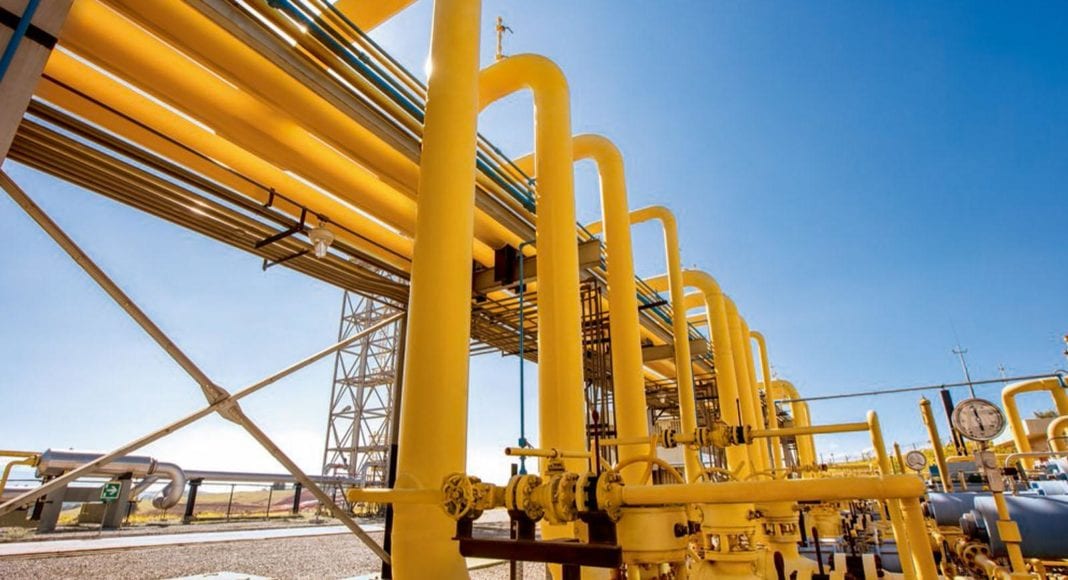New oil producer Guyana is looking to move forward with a US$900 million gas-to-energy project which authorities say will play a major transformational role in the country’s development.
The project, to be located at the Wales Development Zone, West Bank Demerara, proposes the construction of a 220km offshore 12-inch pipeline from the Liza Phases 1 and 2 floating production, storage, and offloading (FPSO) vessels, the Liza Destiny and Unity. That pipeline would extend to La Jalousie/Nouvelle Flanders, West Coast Demerara. There is also a provision for an onshore 12-inch pipeline, approximately 27km long, commencing North of the proposed NGL plant site and extending through and near several villages along the West Coast of Demerara and the West Bank of Demerara, until it meets the offshore pipeline.
ExxonMobil’s local affiliate, Esso Exploration and Production Guyana Limited (EEPGL) says a minimum of 50 million standard cubic feet of gas per day (mmscfd) will be transported through the pipeline by 2024. The pipeline will have a maximum capacity of 130 mmscfd.
Vice President of Guyana, Dr. Bharrat Jagdeo has made it clear that the Guyana Government is determined to see the project to fruition since it forms a major part of his party’s Manifesto promises.
“A political party has to fulfil its promises… We are accountable to the electorate and when we put a Manifesto out that says we’re going to build the Amaila Falls because we’ve studied it, [that] we’re going to go for a gas-to-energy project, we campaigned on this. People gave us the mandate to do this. We said we will do this to give you, cheaper electricity,” he said in a recent interview.
But as Government forges ahead with the project, some in the South American country are asking how exactly will it benefit the nation and how will these benefits be transferred to the Guyanese people?
For starters, the project, which is expected to come on stream by late 2024, is expected to reduce Guyana’s energy sector emissions and will cut the cost for electricity by more than half. It will also create employment.
In his presentation to the National Assembly on August 10, 2021, Senior Minister within the Office of the President with responsibility for Finance, Dr. Ashni Singh, said that the project will bring real transformation to Guyana across all sectors since thousands of jobs will be created, and many communities will be positively impacted.
“The reality is that once this gas-to-energy project materialises and the associated power plants are constructed, we will see an additional 250MW of power added to the national grid. Consider the industrial development that will be catalysed by that. This is not just about constructing a pipeline. This is not just about constructing a power plant. With the advent of this pipeline and powerplant, the level of industrial activity that will be created in the Wales Development Zone alone will generate at least 3000 jobs and the positive spin-overs on the rest of the economy will create tens of thousands of jobs, additionally,” Dr. Singh said.
The cost of electricity has long been regarded by the private sector as prohibitive to investments. In many instances, it has hindered expansion, manufacturing and value-added activities. Dr. Singh said government has recognized that the single biggest impediment to accelerated economic growth and development has been the energy constraint and the country’s inability to generate enough power. Even when enough is generated, it is unreliable, he noted.
He said with the gas-to-energy project, new avenues will be created for investments while Guyanese businesses will be able to better, compete and expand their operations. The project, he noted, will become the genesis for economic transformation and industrialisation in Guyana.
“For a long time, Guyana has been a producer of primary products. Manufacturing and value-added processes are dependent on electricity. If we address the electricity constraints with this project, as we will, we immediately make manufacturing business far more viable than it is has ever been before,” Dr. Singh stated. “This project is not just about electricity. It will lay the foundation for rapid industrial development in Guyana. We will see for the first time, the emergence of a large agro-processing sector. We will see for the first time, a large and competitive manufacturing sector. We will see for the first time, Guyanese people not having to worry about blackout. That is transformation,” Dr. Singh stated.
Meanwhile, Minister of Natural Resources, Vickram Bharrat, said that Guyana’s current import bill for fuel and lubricant stands at roughly US$490 million, which is about 67.2 percent of total net hard currency payments.
He noted that if through this intervention, Guyana can manage to reduce the cost of this bill by half, then the effect on its balance of payment would be quite significant.
“Take, for instance, if we apply this hypothetical saving to the balance of payment for 2019, then our new balance would be a surplus of proximately US$200M, that is additional foreign exchange that could otherwise be added to our international reserve. Hence, irrespective of the size of the reduction, because of the sheer size of our import fuel bill and its effect on our balance of payment, any reduction in our import bill will translate into millions of foreign exchanges in savings,” he said.
The Natural Resources Minister said that in addition to cheaper electricity, other bi-products would be manufactured from the natural gas. In this regard, the Ministry will be preparing a Gas Utilisation Master Plan (GUMP) to review and determine the most appropriate uses for surplus gas. Initial studies have indicated that the most appropriate uses for surplus gas and waste heat are those in support of the agriculture sector including fertiliser production, gas to protein and agricultural processing.
The government has already invited interested parties to submit their proposals to invest in the project.




